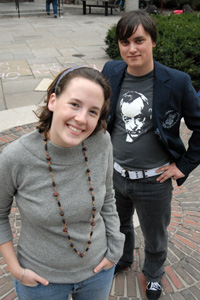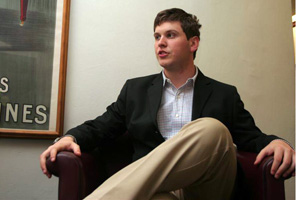Chicago’s young journalists earn kudos for quality of their work
By Julia MorseNews Office
 Kat Glass, Editor-in-Chief of the Chicago Maroon, and her counterpart John Thompson, Editor-in-Chief of the Chicago Weekly congratulated each other on their recent journalism honors. Photo by Yvette Dostatni |
|
Journalism may not be on the menu for College students choosing concentrations, but that has not stopped the University’s aspiring journalists.
The Chicago Maroon, the Chicago Weekly, the Triple Helix and one of WHPK’s student radio show hosts are enjoying local and national recognition this fall for their outstanding achievements.
Named one of the 2007 Newspaper Pacemakers by the Associated Collegiate Press, the Chicago Maroon staff is celebrating, but remaining humble, said College fourth-year Kat Glass, who is Editor-in-Chief of the Chicago Maroon.
“The credit really goes to my predecessors, Tara Kadioglu and Mike Rinaman, who made the decision to join ACP,” Glass said. “It’s a pleasant surprise, and I’m so proud that all our hard work paid off in this way.”
Staff at the Washington Post evaluated the Chicago Maroon, judging it on layout, content, style and depth of reporting, before deciding it would receive the Associated Collegiate Press’ highest honor in the four-year college, non-daily, category—a recognition the Chicago Maroon shared with 10 other college newspapers.
“It is so exciting—there’s really no other way to describe it,” Glass said, adding that Chicago’s lack of a journalism program is a benefit, rather than an obstacle.
“There isn’t that constant supply of writers that other schools may have, but it really adds an interesting ingredient to the newsroom,” she said. “Our writers all study in a variety of areas and have lots of different perspectives and unique experiences.”
The Chicago Maroon acts as a community newspaper, Glass said, noting that the writers have a responsibility to act as both members of the University community and as non-members of the community.
“We have to rely on our peers in order to keep the paper going,” she said. “But at the same time, we also have to keep a certain level of distance in order to remain objective journalists. We really try to hold ourselves to professional standards, regardless of the fact that we are a student newspaper.”
For Glass, the Chicago Maroon has been a gateway into chasing her professional and career dreams.
“I love editing, even more than writing,” she said. “I love the teaching aspect of it, to look at stories from a distance, and I enjoy generating ideas for stories.”
Ultimately, Glass said she aspires to work as an editor for the metro or features desk at a daily city newspaper, but that she knows she will have to “put in time at smaller papers beforehand.”
For now, she is excited to spend her fourth year in the College as Editor-in-Chief of the Chicago Maroon.
“The award is a great accomplishment for us, but it is not going to change the good work our staff does, only to keep us wanting to do that good work,” Glass said.
For its publications during the 2006—2007 academic year, the Chicago Weekly received a Silver Medalist Critique from the Columbia Scholastic Press Association last month. The award evaluation places the Chicago Weekly as one of the top college newspapers in the country.
“It’s almost unspeakable how thrilled I am,” said Chicago Weekly Editor-in-Chief John Thompson, a College fourth-year. “As far as college newspapers go, we’re a bit of an underdog. Two years ago, there were three people on our staff and now there are more than 20. I’m ecstatic about this award—we’ve all worked so hard.”
 Alex Beinstein hosts his own talk show at the University’s radio station WHPK. Political leaders are among his favorite guests.
|
|
Last year’s output of the Chicago Weekly, which Thompson called “an alternative weekly that eschews comprehensive news coverage in favor of focusing on local arts and culture and in-depth news stories,” included stories on fashion, music festivals and concerts, hardcore punk music of the Pilsen neighborhood in Chicago, Bridgeport’s Version Festival 2007, and the ways in which members of the current student government are redefining student government’s role at Chicago.
“We aim to write in-depth stories about things no one else is writing about,” Thompson said, crediting the Chicago Weekly staff as a whole for the success of the newspaper.
“My title is Editor-in-Chief, but it’s just a title,” he said. “We are a tight-knit group—there is a real sense of teamwork at the Chicago Weekly, and I am so proud of our hard work.”
Another group of students recently recognized for their hard work are the members of the Triple Helix, which was named the 2007 Best New Registered Student Organization by the Office of the Reynolds Club and Student Activities.
The Triple Helix is an international non-profit organization that publishes a journal of the same name, which concentrates on the interdisciplinary topics of scientific and technical developments and how those developments impact society. The Triple Helix organization includes more than 800 students from 27 different institutions around the country. Third-years Deepa Sen and Sam Gavzy established the Chicago chapter in the fall of 2006.
“While the University of Chicago is famous for sparking debates within different departments, we felt students needed some way to integrate science and society, especially when the two are so closely tied in real life,” Sen said. “Sam and I started the Triple Helix at the University of Chicago because we felt there were few forums to discuss more than one discipline.”
Since the duo established the publication last year, the staff has grown to 40 members, and the first Triple Helix journal was published this fall. The student writers, editors, designers and event coordinators all come from a great variety of academic fields, including Chemistry, Philosophy, Biology, Law and English, Sen noted.
Gavzy said, “Since its beginnings, our chapter has gone through an enormous amount of growth. We have evolved from purely publishing electronic articles on the Triple Helix Web page to producing an entire journal of print articles written by undergraduates, to finally constructing a science policy division designed to build campus awareness of issues at the interface of science, technology and our constantly evolving social infrastructure that surrounds them.”
Gavzy and Sen agreed that having the Triple Helix named as the best new student organization on campus this year shows that Chicago students recognize the importance of the group’s presence.
“We were so pleased to receive the 2007 Best New RSO award, since it’s great to see positive feedback from the campus community,” Sen said. “The award legitimized our belief that students from the most diverse range of interests can come together to produce relevant events and interesting articles on science.”
The next Triple Helix journal is slated to come out next winter.
College second-year Alex Beinstein may have celebrated his 19th birthday Monday, Nov. 12, but his journalistic resume reads more impressively than some reporters twice his age.
Beinstein is host of his own one-hour talk show, called “Tomorrow with Alex Beinstein,” on WHPK, the University’s public radio station. Beinstein has interviewed a number of prominent guests, including Howard Wolfson and Phil Singer, advisers to U.S. Sen. Hillary Clinton, Nicholas Kristof, a New York Times columnist, John Bolton, the former United Nations Ambassador and Chuck Todd, NBC News Political Director.
On Tuesday, Oct. 16, his accomplishments were published in a profile on http://politico.com, which also has a print publication and is one of Beinstein’s favorite sources of political news, he said.
“I try to consume as much media as I can, and I really love reading politico.com. It was really exciting to be featured in their publication,” he said. Although Beinstein said he would rather be the interviewer than the subject being interviewed, he appreciated the attention. “I was really honored and it certainly is opening new doors,” including an offer to write for politico.com’s print and online publications. A literary agent also contacted Beinstein about writing a book.
“I love asking questions about current political and world events while using historical references,” he said, noting that he is concentrating in History. “I also have a probing question-and-answer style. I try to find different and unusual ways to ask questions.”
When asked which of his interviews stands out as a favorite, Beinstein recalled his conversation with a fellow member of the University community.
“Austan Goolsbee. We talked about economic policy, minimum wage, education and much more. We were planning on doing a 10-minute interview and it ran to 30 minutes, and neither of us even noticed,” Beinstein said of his conversation with Goolsbee, the Robert P. Gwinn Professor of Economics in the Graduate School of Business.
He added that he is “incredibly thankful” to WHPK for giving a first-year student his own radio show. “I am still relishing the fact that I have my own radio show, that I’m studying at Chicago and that I was accepted into the undergraduate business program,” he said of the Chicago Careers in Business Program.
Beinstein’s interview wish list includes President Zimmer, Bill O’Reilly and a member of Mitt Romney’s presidential campaign—the only presidential campaign that has refused his interview request, he said.
“Overall, I would just love to talk to all the major political players out there,” Beinstein added.
More information about Beinstein and his radio show is available at http://alexbeinstein.com.
![[Chronicle]](/images/sidebar_header_oct06.gif)
